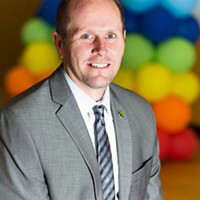They've been doing it for as long as they've been a couple. Every Saturday morning for almost 15 years, Ron Sperry and his partner Scott Bishop make the 15-minute drive from their Plaza Midwood home to Einstein's Bagels on South Boulevard. Today happens to be a particularly dreary Saturday, rainy and damp. The puddles in the parking lot are widening. It doesn't stop them. The ritual, says Sperry, "gives us some time to sit together and plan our day, think about what we need to get done for the weekend."
In between chewing and conversation, Sperry and Bishop wave to friends and nod to other regulars stopping in for a quick nosh. Sperry, 45, admits their friends mock them for the weekly bagel-shop breakfast. It started when the two first lived together in a townhouse just around the corner and could walk to Einstein's, and continues even though they now live in a different neighborhood. The only other part of the routine that's changed, at least for today, is Sperry's order. He brings a yogurt parfait to the table and explains that heavy carbs won't work this week. "It's not a vanity thing," he protests. "It's an economic thing. I don't want to have to buy a new suit size!"
Sperry is counting down to the end of the month when Bishop, also 45, will be honored as North Carolina Volunteer of the Year at the Human Rights Campaign's annual gala, held Feb. 25 at the Charlotte Convention Center. The HRC fights for the civil rights of the Lesbian, Bisexual, Gay and Transgender (LBGT) community. Bishop got involved after writing a $35 check to the cause years ago. "After I sent the money, they kept calling me asking for more, to the point where it was just annoying," Bishop says. "Then a friend dragged me to their annual gala where I watched this emotional video about what they do to further equality, and well, I got it."
Bishop got it to the point that he felt he had to get involved somehow. He went to a monthly meeting and says he was horrified at how disorganized the organizing committee was. That annoyed him even more. "I went to see where I could fit in and quickly realized that's where they needed me. I'm a project manager by nature, so I knew I could bring some sort of organization," he says.
Robert Dogens was impressed with Bishop. "Anything he does, he does 120 percent," says Dogens, who serves on the North Carolina Governors Board for HRC. "Scott was c osen to be honored because of all the work he did last year as it relates to the marriage amendment. He mobilized the business community to speak out."
By all accounts, Bishop is focused, confident and quiet in his leadership style. For six months last year, he worked full time convincing more than 300 small businesses across the state to sign a petition against putting the marriage amendment on the ballot. The amendment would literally rewrite the North Carolina Constitution to prohibit civil unions, make it illegal to recognize gay marriage (which is actually already illegal in the Tarheel state), and strip away domestic partnership benefits that government employees currently receive. (Mecklenburg County has offered domestic partnership benefits to its employees since 2009; the city of Charlotte still does not.) Bishop also serves on a small committee working to get Charlotte to pony up to its employees in domestic partnerships.
While Bishop and a team of volunteers managed to garner much support against the amendment — even Gov. Bev Purdue was against it — the Republican-controlled legislature last September voted to put the issue on the upcoming May primary ballot when they assumed mostly conservatives would turn up at the polls. Turns out, Democrats will now be there, too, since Perdue announced she will not seek re-election. (A sitting governor running for re-election would almost certainly have meant there would be no need for a Democratic primary.)
The amendment, says Dogens, "bothers me because I don't think you should ever put the rights of a minority up for a popular vote." He is worried that the amendment might pass, pointing out that 34 states already have passed similar anti-gay marriage legislation and North Carolina is the lone Southern holdout. A 2006 Arizona ballot referendum is the only time the gay-marriage issue failed after going to voters.
Bishop had the time to dedicate to the fight after Bank of America unexpectedly pink-slipped him in February 2010. "He was the busiest unemployed person I've ever seen," says Sperry, who, as an interior designer, admits it was weird to suddenly be the "stable" one in the house. The two had been saving money to start a business but decided together that Bishop would instead dedicate himself to fighting the marriage amendment. They made the decision, like most things in their relationship, together.
In conversation, Bishop and Sperry refer to themselves as an "old married couple," but they are not actually married. They could legally marry in Bishop's hometown of Boston. They could form a recognized civil union in Sperry's hometown in Illinois. But they choose to wait until gay marriage is legal in the city they call home. "It would seem bizarre to go to another state to get married. Our friends are here. North Carolina is our home," Sperry says.
"Oh sure, it's disappointing," Sperry adds. "What a wonderful thing it would be if we could [be married], but we don't need a marriage certificate. It would still be an amazing thing to have that happen."
Bishop completes the thought: "Getting married to me would just be the formalization of what we have now."
Sperry and Bishop moved in together not long after they started dating. "I was not looking for something long-term," says Bishop. Get them talking about the very beginning and there are lots of laughs — and a few missing answers. The exact details are fuzzy, but both agree they met on a Tuesday night at a now-long-gone neighborhood gay bar not far from the bagel shop they now visit each Saturday morning. Bishop, the more serious of the two, was 29 and an up-and-coming project manager at Ernst and Young when they got together. He was newly "out" to his friends and family, and had seriously dated only one other man.
Why did Bishop wait until almost 30 to come out? His partner of more than a decade wants to know, too. "Yeah Scott, why did you wait?" Sperry asks with a smile in his voice.
"I guess it was a matter of becoming more comfortable with myself," Bishop answers. "I mean, I knew, but I didn't want to admit to it. I think moving here, away from my family, allowing myself to figure out who I was, being more comfortable with myself ... it allows you to tell everybody." Bishop wanted to tell his parents in person and remembers specially planning a weekend getaway to their Boston home. "I actually told them on National Coming Out Day, Oct. 10, 1996." He remembers sitting outside and telling his dad, who hugged him and said simply, "I still love you."
Bishop's mom took a few months to get used to the idea, but she now regularly contributes to the HRC and proudly reads its newsletter every month.
Sperry had a different coming-out experience. Grinning, Bishop points to his partner and exclaims, "He told his mom when he was 12!" Sperry's older brother was gay. "It was a recognized thing in our house," Sperry says. "We already understood the concept of gay, so it wasn't a big deal at all. I felt like the support group was already there. Everybody already understood what it meant. I didn't have to explain anything to them."
Besides, Sperry adds ruefully, "I had to define normal for myself anyway." His father had a hook in place of his arm after being shot down behind enemy lines as a paratrooper during World War II, he says. "So there were a lot of things in my family that were just normal, whereas other kids might have been like, what's that? To me, it was all just normal."
There seems to be a new normal in Charlotte these days. Most recently, voters elected the first openly gay City Council member. And, of course, planning is well underway for the Democratic National Convention, which comes to Charlotte in September. This is all on the heels of the last presidential election, when North Carolina went blue for the first time since Jimmy Carter. Bishop played a big role in those milestones. He successfully helped with LaWana Mayfield's council run and now works full time as the director of project management for the DNC host committee.
The LGBT community has been a large part of the Democratic Party for a long time, and this year, Charlotte, as the DNC host city, is expected to welcome more LGBT folks than any other previous political convention. Its leaders have repeatedly said they are working to make this the most open and accessible Democratic convention ever. "The local LGBT community was a big part in helping to bring the convention here," says convention CEO Steve Kerrigan. He points out that the gathering is not just about officially nominating the president, but also reaffirming what Democrats stand for. "Diversity is a big part of the Democratic Party and who we are."
Kerrigan hedges when asked about the possibility that the anti-gay marriage amendment could pass in the same year that the Democratic spotlight is shining on Charlotte. "My hope is that it will be defeated in May, and we are going to continue to push the president's agenda," Kerrigan says. "I believe the president has said this, that we should not be enshrining discrimination in any state constitution, and I'm truly hopeful it won't happen in the state I'm calling home."
Kerrigan himself is openly gay and says Charlotte has offered nothing but Southern hospitality since the 40-year-old Massachusetts native moved to town to lead the convention last June. "It's a great community, a very vibrant LGBT community. It is a community, like any other in Charlotte, that is focused on building a wonderful place to live." He is quick to add, "I'm really hopeful we'll have the right result in May. I'm opposed to any discrimination and I really do believe the people I've met in North Carolina will make that happen."
Because North Carolina is such a focal point in the 2012 campaign, this year is the first time a sitting cabinet member will speak at the annual HRC gala for the Charlotte region. Secretary of Health and Human Services Kathleen Sebelius will deliver the keynote address. A record-setting 1,500 people are expected to be in the audience.
Scott Bishop's parents will be among them. They are flying in to see their son honored at the gala that Saturday night. Of course, that morning they'll be doing something equally as important. Scott's parents will join him and Ron in their weekend ritual. The four will start the celebration — with bagels.
Michelle Boudin is an award-winning reporter at WCNC-TV and frequent contributor to area publications. For more info on the HRC, visit www.hrccarolina.org.





